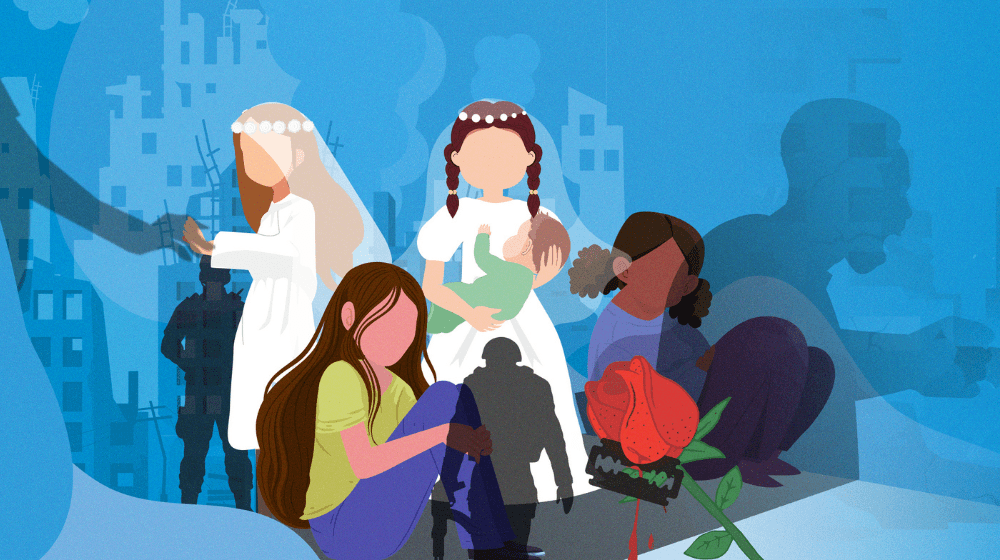In the heart of every crisis, a beacon of hope and resilience shines through: adolescent girls. Their tales of hardship are paralleled only by their unwavering yearning for a brighter future.
"After the war came to Aleppo, I stopped being a girl, because the world stopped treating me like one,” recalls Sara, a young woman from Syria, who grew up in the midst of the crisis. Like many girls in her community, what first began as stories of looming threats against girls quickly became her reality.
“Almost overnight, girls like me were being targeted. Many were abducted, raped, or killed. For those who were not, the prospects weren't much better."
Throughout the Arab region, humanitarian crises are defining the lives of girls like Sara, many of whom spend their formative years surviving violence, displacement, abject poverty, and mounting health threats. As the world marks the International Day of the Girl Child in 2023, violence and instability continue to plague Syria, Palestine, Yemen, Sudan, Lebanon, and other countries throughout the region, with fears of a much wider regional conflict that will cause incalculable suffering to innocent civilians.
As in all crises, adolescent girls are at particular risk. The chaos and breakdown of societal structures often expose them to heightened levels of sexual and gender-based violence, including forced and early marriages, trafficking, and exploitation. Disruption of educational opportunities further compounds their vulnerability, sidelining their prospects for personal development and economic independence. Additionally, limited access to essential healthcare services, including reproductive health, puts their lives and futures in jeopardy. The convergence of these risks not only infringes on their fundamental rights but can also perpetuate cycles of disempowerment, diminishing their potential to contribute to their communities' recovery and resilience.
Over the past several years, UNFPA has been actively engaging adolescent girls in humanitarian settings through a multitude of programmes designed to understand, support, and empower. These have served as much-needed platforms for girls to amplify their voices and share experiences about life in crisis in the hope of finding their way to a more hopeful future. For many, such a future is almost untenable. In the words of Jomana, an adolescent girl from Gaza who survived the 2021 hostilities, “wars come and go, but their impact stays forever.”
However, amidst this bleak landscape, the resilience of these young girls shines bright. Dalia, a refugee from Raqqa, dreams of a world of equal opportunities. "I want to live in a world where every girl has choices and the power to create the life she wants to live,” she asserts. Despite facing family violence and the atrocities of war, she remains determined to become an architect and rebuild her homeland. Like many others, she has not allowed her traumatic experiences to extinguish her passion or her dreams for a better future.
These stories reflect the undeniable resilience and spirit of young girls throughout the region. Their passion for self-betterment and learning, their keen awareness of their circumstances, and their unyielding ability to adapt and rise above make them not just survivors, but beacons of hope in their communities. Their insights and experiences are invaluable for humanitarian and development organisations worldwide.
"In a world fraught with challenges, the unique perspectives and strengths of our adolescent girls are not just assets but essential cornerstones,” explains Laila Baker, UNFPA Regional Director, Arab States. “It's imperative that our programming is not only girl-friendly, but girl-led, empowering them to shape the narrative of their futures and enriching the fabric of our societies in the Arab region and beyond."
Empowering adolescent girls must become a priority for the international community. It's time we recognize their worth, nurture their psychosocial development, and provide them the tools to shape their destinies. Programmes should be designed to imbue them with a sense of autonomy, agency, and voice.
The words of Ruba, an adolescent girl from Idlib, perfectly encapsulate this imperative: “I know the world I want to live in. Help me build it, and I will never stop working.”



